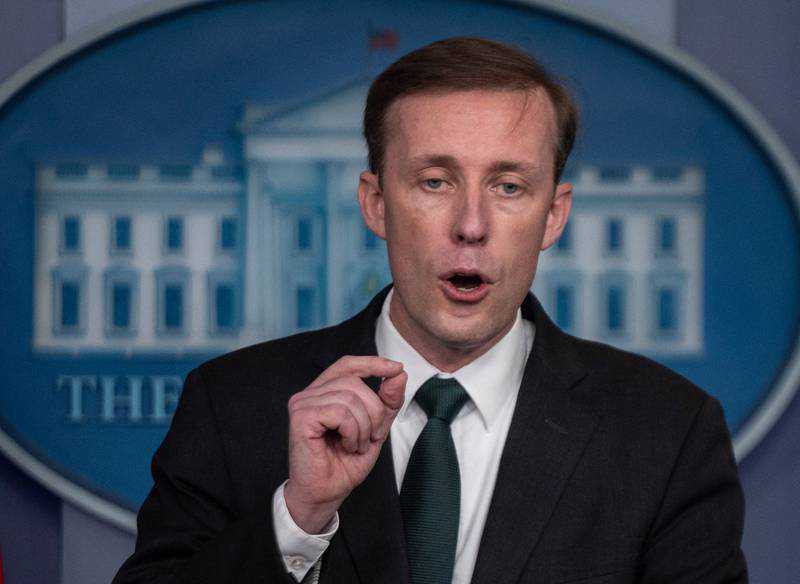Biden administration vows ‘other options’ if Iran nuclear diplomacy fails
06 October, 2021

The White House on Tuesday pledged that US President Joe Biden is ready to “turn to other options” on Iran’s nuclear programme if stagnant negotiations aimed at restoring American and Iranian compliance with the nuclear deal fail.
The comments came after US National Security Adviser Jake Sullivan met his Israeli counterpart, Eyal Hulata, at the White House as part of the third US-Israel Strategic Consultative Group meeting under the Biden administration.
Mr Sullivan stressed Mr Biden’s fundamental commitment to Israel’s security and to ensuring that Iran never gets a nuclear weapon, National Security Council spokeswoman Emily Horne said after the meeting.
“Mr Sullivan explained that this administration believes diplomacy is the best path to achieve that goal, while also noting that the president has made clear that if diplomacy fails, the United States is prepared to turn to other options,” the White House said.
The meeting marked Mr Hulata’s first visit to the White House as the earlier strategic consultative group meetings were held online.
The Biden administration has sought to revive the nuclear deal by offering Iran relief from the crippling sanctions imposed by former president Donald Trump in exchange for Tehran scaling back activities that breach the 2015 accord.
A senior US official said on Monday that Iran’s breakout time to build a nuclear weapon had gone down from a year to a few months since Mr Trump withdrew from the deal, prompting Tehran to increase its nuclear activities in breach of the accord.
Like his predecessor, Israeli Prime Minister Naftali Bennett opposes US re-entry into the nuclear deal.
“Since the Bennett government came in, we have been engaged in almost daily, weekly and increasingly very constructive, very deep consultations between our governments at how to effectively address many regional challenges, including the threat posed by Iran,” the senior US official said before Mr Hulata’s visit.
“And that includes Iran’s nuclear programme, destabilising regional activities, its ballistic missile programme, support for terrorism [and an] Iranian-backed [drone] network.”
Iran has not agreed to resume indirect nuclear talks in Vienna since hardline cleric and nuclear deal sceptic Ebrahim Raisi took office in August.
The US, Iran and the deal’s other signatories last met for a sixth round of talks in Vienna in June under former Iranian president Hassan Rouhani.
But Iranian Foreign Ministry spokesman Saeed Khatibzadeh indicated last week that he expects Iran will return to the table in Vienna by November.
The two sides agreed under Mr Rouhani that the US will relieve sweeping sectoral sanctions and that Iran will scale back its nuclear activities to revive the deal.
But Tehran has also insisted that Mr Biden lift the additional sanctions that former president Donald Trump imposed after withdrawing from the accord in 2018.
The senior US official said the Americans would also stress “the importance of ensuring calm in Gaza” and “the importance of efforts to dampen potential flashpoints in the West Bank in Gaza and take steps to improve the lives of Palestinians”.
The official also highlighted US support for the Abraham Accords, which normalised relations between Israel, and the UAE and Bahrain, saying Mr Sullivan discussed the agreement during his recent trips to the UAE and Egypt.
“The two countries … are seeing a real blossoming of relations with Israel, and that’s something that we believe is very important and must be strengthened wherever possible.”
The official also said that the $1 billion request to Congress in additional funding for Israel’s Iron Dome missile defence programme was on the agenda in the meeting between Mr Sullivan and Mr Hulata.
The House of Representatives voted 420-9 to approve the additional funding last month after members of the Congressional Progressive Caucus briefly managed to delay it by forcing it out of a US government funding bill.
Democrat Bob Menendez, the foreign relations committee chairman, tried to pass the Iron Dome funding bill unanimously in the Senate on Monday.
Republican Rand Paul blocked his efforts, arguing that the US should offset the cost by cutting aid to Afghanistan after the Taliban’s takeover.
Mr Paul’s objection delayed final passage of the bill, and the Senate is expected to hold a floor vote on the legislation at a later date.
Israel, the Biden administration and the overwhelming number of congressional supporters of the additional funding have said it was necessary to replenish the Iron Dome batteries depleted during Israel’s latest war against Hamas in May.
That war killed at least 243 Palestinians and 12 Israelis, while devastating the Gaza Strip.
But that $1bn funding requests represents a 60 per cent increase on the $1.7bn the US has provided Israel in Iron Dome funding over the past decade.
It is also 14 times more than the $73 million that Congress already appropriated in Iron Dome funding for Israel this year.
Source: www.thenationalnews.com
